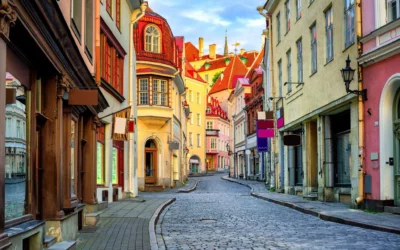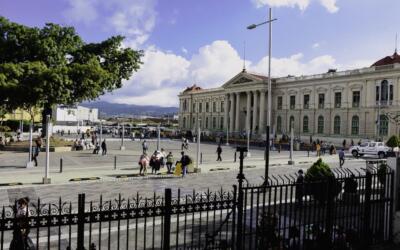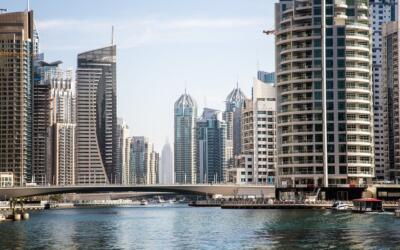Istanbul, Turkey’s largest city, is an exciting place offering a unique trail of history, modern culture, and an excellent startup ecosystem, making it a digital nomad’s favorite destination. According to the Nomad List, the city attracts roughly 8,642,300 visitors annually, with an impressive return rate of 16%.
Table of Contents
- 1 Visa application
- 2 Cost of living and Cost of living arbitrage
- 3 Blockchain startups and the crypto community
- 4 Popular recreational activities and fun spots
- 5 How safe is Istanbul?
- 6 Cultural and social norms
- 7 Political and economic stability
- 8 Language and language barriers
- 9 Health and Vaccination
- 10 Electrical standards
- 11 Telephone and internet plans
- 12 Climates and seasons
- 13 Taxation for digital nomads
- 14 Popular cuisine
- 15 Common concerns
But why would Istanbul, of all the places, be such a tourist, expat, and digital nomad attraction?
Well, several reasons make this possible; one, considering data on survey platforms like Numbeo and Nomad List, there is little doubt that this Turkish city is affordable. This means nomads from pricey destinations like New York City can save while working from here.
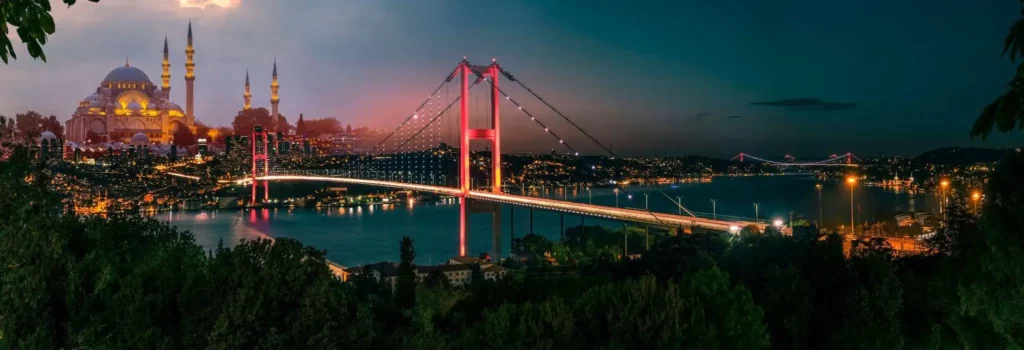
Besides Istanbul’s good internet speeds, nomads are also impressed with the city’s flourishing startup enterprise. This means there are enough coworking spaces and tech hubs where digital nomads can connect, interact and collaborate.
Beyond work-related opportunities, Istanbul also offers a rich cultural experience with its unique architecture and historical landmarks. The city has a long and exciting history, dating back at least 2500 years, when Greek settlers founded it as Byzantium. Over the years, it has been ruled by various empires and cultures, each leaving its mark on the city’s culture and architecture.
In addition to the historical attractions, Istanbul boasts a thriving nightlife activity that some digital nomads can enjoy after work. With all these factors combined, it’s no surprise that the Turkish capital is fast becoming a top choice for digital nomads seeking an inspiring and affordable destination to work from.
But first things first, let’s find out how to get there.
The table below shows the city’s scores in the listed areas as observed by digital nomads.
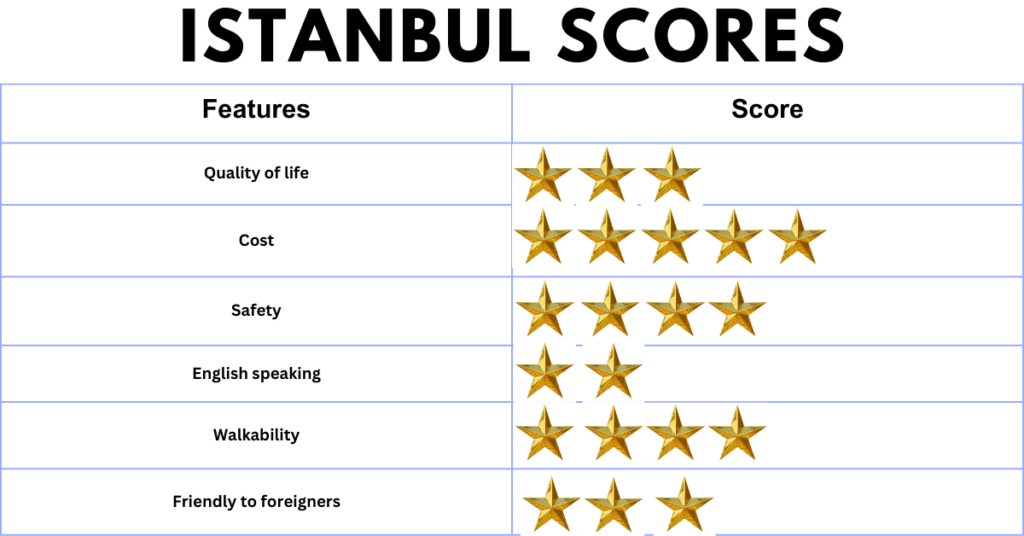
Visa application
Turkey offers several visa options, including tourist, working, study, and medical and research visas. A few countries are exempted from visa requirements, including those from the EU region.
Visa available for digital nomads
So far, Turkey does not have a custom digital nomad visa. The best option is a tourist visa which allows up to 60 days stay in the country. To apply for it, you have two options;
- you can visit the nearest embassy
- apply online
Regardless of your chosen method, you must fill out an application form that requires you to provide essential information such as your name, date of birth, nationality, the type of visa you require, and the duration of your stay in Turkey.
Additionally, you must provide two high-quality photographs, where 80% of the picture should be your face, and you should look directly into the camera. The dimensions of the photos should be 5cm by 6cm.
Your passport’s validity should be at least six months from the date of your visa application, and there must be at least one blank page for the visa sticker.
The embassy will also ask for proof of accommodation in Turkey, which could be in the form of a hotel or Airbnb booking or a letter from a person or persons who are willing to accommodate you during your stay.
You must also show how you plan to support yourself in the country. This can be demonstrated by providing bank statements for the past three months, proof of regular income, or a letter from someone who guarantees to cover your expenses during your stay. You must have access to at least €50 for each day you plan to spend in Turkey.
The cost of applying for a visa
The visa fees depend on your country of origin and range between USD 78.50 and USD 61.50.
Difficulty in Visa application
The ease or difficulty of obtaining a Turkish visa primarily depends on one’s country of origin. In other words, if you hail from any of the 78 countries and territories exempt from visa requirements, you need not apply for a visa for stays shorter than three months.
Here is a roster of the countries that are exempt from visa application:
| Albania | Greece | Luxembourg | Slovakia |
| Andorra | Guatemala | Malaysia | Slovenia |
| Argentina | Honduras | Moldova | South Korea |
| Belize | Hong Kong | Monaco | Sweden |
| Bolivia | Hungary | Montenegro | Switzerland |
| Brazil | Iceland | Morocco | Tajikistan |
| Bulgaria | Iran | New Zealand | Trinidad & Tobago |
| Chile | Israel | Nicaragua | Tunisia |
| Colombia | Italy | North Macedonia | Ukraine |
| Czechia | Japan | Panama | United Kingdom |
| Denmark | Jordan | Paraguay | Uruguay |
| Ecuador | Kazakhstan | Peru | Uzbekistan |
| El Salvador | Kosovo | Qatar | Vatican City |
| Estonia | Kuwait | Romania | Venezuela |
| Finland | Kyrgyzstan | San Marino | Bosnia & Herzegovina |
| France | Lebanon | Serbia | Saint Kitts & Nevis |
| Georgia | Liechtenstein | Seychelles | |
| Germany | Lithuania | Singapore |
Cost of living and Cost of living arbitrage
Turkey has one of the lowest costs of living in continental Europe. That becomes even more apparent with the high inflation that the country has been experiencing in the last few years. This reality gives digital nomads a significant cost of living arbitrage. For example, to maintain the same standard of living that you can have with $9,100.0 in New York, NY, you would require approximately $2,675.2 (50,757.9 TL) in Istanbul.
Food Cost

Transport

Upon arriving in Istanbul as a digital nomad, you have various transportation options at your disposal. These include air, road, and railway networks. As you would expect, these major transport options are ably complemented by traditional taxis, ride-hailing Apps, electric scooters, and bicycles.
Air transport
Istanbul has two major airports – Istanbul Airport and Sabiha Gokcen International Airport. These airports serve domestic and international flights, making getting to and from Istanbul easy. The distance between Istanbul Airport and downtown Istanbul is around 40 km, which could take 45 minutes to travel by taxi.
On the other hand, Sabiha Gokcen International Airport is situated about 48 km away from the city center, and the commute time could take approximately an hour, depending on traffic conditions and the route you choose. The typical fare for a taxi ride from Istanbul New airport to the city center is roughly €20 (equivalent to TL 400).
Road Transport
Istanbul has a well-developed road network that includes highways, expressways, and surface streets. Public buses, taxis, and private cars are the most common modes of transportation on the city’s roads. The city is also connected to other parts of Turkey via intercity bus services.
Istanbul has public and private buses that operate on the same routes and charge the same fare. Public buses can be identified by the IETT logo representing the state operator.
Tickets for public buses can be purchased at stalls that display either the “IETT” or “Bilet” logo, though this may not be applicable for all stops. On the other hand, private buses accept both the same tickets as public buses and cash payments.
To determine which bus to take, it’s recommended to inquire at your hotel, as only the major and significant stops provide information on the routes. Alternatively, you can view the various bus routes by visiting the official IETT website.
As for mini buses, they are small buses that pick up passengers on the street without any designated stops. The destination is indicated on the front of the bus, and passengers can indicate to the driver if they wish to board.
The Suburban trains

Suburban trains, also known as Marmaray trains, are a popular mode of transportation for commuters in Istanbul, Turkey. These trains operate on several lines that connect the city’s suburbs and outskirts to the heart of Istanbul.
The Marmaray suburban train lines serve over 50 stations, ranking it among the world’s most developed suburban train systems. The trains run on a frequent and reliable schedule, with services operating from early morning until late at night.
One of the main advantages of the Marmaray train system is its ability to connect the two sides of Istanbul via the Bosphorus tunnel, which provides a convenient and quick way for commuters to travel between the Asian and European sides of the city. This feature has greatly reduced commuting times for many residents and has helped to alleviate traffic congestion on the city’s roads.
These trains have modern amenities, including air conditioning, free Wi-Fi, and comfortable seating. The trains are also wheelchair accessible, making them an inclusive mode of transportation for all passengers.
Taxi Transport
Istanbul has more than 20,000 taxis available for transportation, making it effortless to catch a ride. The standard taxis in Istanbul are identifiable by their yellow color and “taksi” sign. Also, luxury options are available in turquoise and black but at a higher price. You can stop a taxi from the street, head to a taxi rank, or contact a local radio taxi company to book your ride.
In Istanbul, the starting fare for a taxi ride during normal tariff hours is 13.00 TL, with a range of 10.00-20.00 TL depending on the specific circumstances. This initial charge covers the first few kilometers of the journey and the time spent waiting in traffic or at traffic lights.
Once the journey begins, the cost per kilometer during normal tariff hours is about 8.51 TL, with a range of 6.30-12.00 TL depending on various factors, such as the distance traveled, traffic, and time of day. Please note that Istanbul is a large city with heavy traffic, so fares can vary significantly depending on the specific route and the time spent in traffic.
If, for some reason, the taxi driver has to wait for you during the journey, the cost of waiting is about 100.00 TL per hour during normal tariff hours, with a range of 67.20-200.00 TL depending on the specific circumstances.
Additionally, fares at night and on weekends or public holidays may be higher due to higher demand and lower availability of taxis. You should always check the fare before starting your journey and ensure the taxi has a working meter to avoid being overcharged.
It is worth noting that while the cost of taking a taxi in Istanbul may vary depending on the prevailing circumstances, it can be a convenient and efficient way to navigate the city, especially for a nomad who is unfamiliar with the public transportation system or prefers the luxury and convenience of a private ride.
| Fixed Charges | Price | Distance (km) | Estimated Price | |
| Taxi Start (Normal Tariff) | TL 13.00 ($0.68) | 3 | TL 38.53 ($2.02) | |
| Taxi Rate per 1 km (Normal Tariff) | TL 8.51 ($0.45) | 6 | TL 64.06 ($3.36) | |
| Taxi 1 hour Waiting (Normal Tariff) | TL 100.00 ($5.25) | 7 | TL 72.57 ($3.81) |
Includes data from: https://www.numbeo.com/taxi-fare/in/Istanbul
Taxi hailing apps
These taxi options have become increasingly popular in Istanbul over the past few years. With the advent of smartphone usage and the convenience of hailing a taxi from anywhere, these apps have made it easier and more efficient for anyone to get around the city.
Some of the most popular taxi-hailing apps in Istanbul include
- BiTaksi,
- iTaksi,
- Uber
You can leverage these apps to request a ride from your current location and track the taxi’s arrival in real-time. You can also estimate the fare before the ride begins, which can help avoid surprises.
One of the advantages of using these apps is that they offer a safer option for hailing a taxi, as all the drivers are registered with the app and undergo background checks. Additionally, the apps allow users to rate their driver after the ride, which can help ensure a higher level of service.
While taxi-hailing apps have become more popular in Istanbul, traditional taxis are still widely used. Some users may prefer traditional taxis because they are often cheaper than a taxi-hailing app, especially during high demand. Additionally, some users may find that traditional taxis are more readily available, especially in areas with limited cell phone coverage.
Bicycles
Istanbul also has a bike-sharing system called Bisim, which allows you to rent a bike for a set period of time. You can find Bisim stations throughout the city, and the system is relatively affordable.
Accommodation
Istanbul, one of the world’s most fascinating cities, offers a wide range of accommodation options for visitors of all kinds. From luxurious hotels to budget-friendly hostels, Istanbul has something for every digital nomad. The Turkish capital has the following options to offer.
Luxury hotels

Istanbul boasts some of the world’s most luxurious hotels. These hotels offer exceptional service, stunning views, and amenities, including spas, pools, and restaurants. Some of the most well-known luxury hotels in Istanbul include
- The Four Seasons Hotel Istanbul at the Bosphorus
- The Ciragan Palace Kempinski Istanbul
The Shangri-La Bosphorus According to Nomad List, the median hotel price in Istanbul is $1778 per month and $83 per night.
Boutique hotels
Istanbul has several small, stylish boutique hotels that offer a relatively intimate and personalized experience than larger hotels. Undoubtedly, most digital nomads would prefer this option to actualize their cost arbitrage mission. These hotels often have unique decor and excellent service and are located in some of Istanbul’s most charming neighborhoods. Some popular boutique hotels in Istanbul include
- The Vault Karakoy
- The Tomtom Suites
- The Witt Istanbul Suites
Hostels
Istanbul also hosts a number of budget-friendly hostels that offer comfortable accommodations for travelers on a tight budget. Hostels are a good option for solo travelers (i.e., digital nomads) or groups of friends who want to meet other travelers. Some popular hostels in Istanbul include
Airbnb
Airbnb is popular for travelers who want to experience Istanbul like a local. The city has many Airbnb options, including apartments, lofts, and even traditional Ottoman houses. Staying in an Airbnb is a sure way to get a feel for Istanbul’s unique culture and neighborhoods.
According to the Nomad list, Airbnb rentals go for a median price of $1681 per month and $55 per night. If you prefer an apartment, expect to spend an average of $1379 monthly on a one-bedroom studio within the city center.
Guesthouses
Istanbul has many small guesthouses and family-run accommodations that offer a home-like atmosphere. Guesthouses are often located in historic neighborhoods and offer a unique cultural experience. Some popular guesthouses in Istanbul include
- Sultanahmet Guest House
- Tulip Guesthouse
- Istanbul Hotel & Guesthouse
No matter your budget or preferences, Istanbul has many accommodation options to suit your needs. Whether you choose a luxurious hotel, a budget-friendly hostel, or something in between, you will surely have a memorable stay in this fascinating city.
Neighborhoods popular with digital neighborhoods
Here are three popular neighborhoods in Istanbul that are known to be popular among digital nomads;
Kadikoy
Set on the Asian side of Istanbul, Kadikoy is a cool bohemian neighborhood that is popular among young people and digital nomads. It has a lively atmosphere, with many cafes, bars, and restaurants. Kadikoy also hosts Moda, a trendy area with a beach and a park that is popular for picnics and outdoor activities.
Beyoglu
This neighborhood lies on the European side of Istanbul and is quite popular among tourists, expats, and digital nomads. It is particularly known for its nightlife, defined by many bars, clubs, and restaurants. Beyoglu is where you find Istiklal Avenue, a pedestrian street that is popular for shopping and people-watching.
Cihangir
Another popular neighborhood on the European side of Istanbul, Cihangir, is known for its bohemian atmosphere and artistic community. It has many cafes, art galleries, and independent shops. Cihangir also features several coworking spaces, making it an ideal location for digital nomads.
Internet (connectivity, speed, and cost)
In Istanbul, internet speeds vary depending on the type of connection. For mobile internet, the median download speed is 36.92 Mbps, and the median upload speed is 14.10 Mbps. This is a reasonably fast speed that allows users to download and stream content seamlessly on their mobile devices. Additionally, the latency rate is 22 ms, which is relatively low and ensures that users can access the internet quickly and efficiently.
On the other hand, fixed broadband speeds in Istanbul are slightly faster than mobile internet speeds. The median download speed for fixed broadband is 37.32 Mbps, which is comparable to the mobile internet speed. However, the median upload speed for fixed broadband is significantly slower, at 7.15 Mbps. Despite this, users can still upload content and stream videos with minimal buffering. The latency rate for fixed broadband is even lower than mobile internet, at just 8 Ms. This means that users can enjoy a lag-free internet experience, even when using applications that require a fast and stable connection.
Istanbul’s internet speeds are relatively fast and reliable. Whether you’re using mobile internet or fixed broadband, you can expect a fast download speed and low latency rate. However, fixed broadband may be better than mobile internet if you require faster upload speeds.
| Mobile Internet | Fixed Internet | |
| Median Download Speed (Mbps) | 36.92 | 37.32 |
| Median Upload Speed (Mbps) | 14.1 | 7.15 |
| Median Latency (ms) | 22 | 8 |
Internet cost
Istanbul’s internet infrastructure is quite impressive, given the speeds discussed above. This allows residents of Istanbul to enjoy high-speed internet without worrying about exceeding their data limits. The internet service in Istanbul is provided through a combination of cable and ADSL technologies.
The monthly price for internet service in Istanbul ranges from 150.00 TL to 300.00 TL depending on the provider and the selected package. This is a reasonable price range for high-speed and unlimited internet access, considering the benefits it provides to individuals and businesses in the city.
Best coworking spaces

Istanbul has an impressive coworking space with various facilities available for entrepreneurs, freelancers, and remote workers. Let’s sample a few popular ones.
Kolektif House
Kolektif House is among the well-known coworking spaces in Istanbul, with various locations across the city. It offers a range of amenities, including meeting rooms, event spaces, and a community of like-minded professionals.
Impact Hub Istanbul
This facility focuses on social impact and innovation. It offers a range of programs and events to help entrepreneurs and startups grow their businesses.
ATÖLYE
The Atolye Coworking Space is more than just a shared office space. It is a strategic design and innovation consultancy offering a unique problem-solving approach.
They believe in harnessing the power of community to tackle complex challenges and create lasting impact. With a team of expert strategists, designers, and community builders, these guys work with various impact-focused partners, including government agencies, private sector companies, academic institutions, and non-governmental organizations.
Workinton
They offer flexible workspaces for individuals and teams of all sizes. Workinton has several locations across Istanbul, with amenities like meeting rooms, private offices, and event spaces.
You may choose hourly, daily, or monthly plans to suit your needs, allowing you to plan your work. A member can work for an hour or all day at the desk of their choice while benefiting from pleasant treats and connecting with other professionals.
StartersHub
StartersHub is a coworking space and accelerator that helps startups grow their businesses. It offers mentorship, networking opportunities, and unique access to a community of investors and entrepreneurs.
Granted, Istanbul has many coworking spaces to choose from. Whether you’re a freelancer, entrepreneur, or remote worker, there’s sure to be a coworking space that meets your needs in this lively city. If you are already in the city, keep looking; you will surely find a nice one.
Blockchain startups and the crypto community

In recent years, Istanbul has emerged as a major blockchain and cryptocurrency innovation hub. The city has a cheerful community of tech entrepreneurs, developers, and investors leveraging blockchain technology to create new solutions and business models.
Turkey’s government has also shown a keen interest in blockchain technology, with the country’s central bank exploring the prospects of introducing a government backed Central Bank Digital Currency or CBDC.
The city has a growing number of blockchain and crypto startups, including cryptocurrency exchange Bitci and blockchain-based payment platform Papara.
Istanbul is also home to some crypto-related events, such as the Istanbul Blockchain Week and Blockchain Turkey Summit, which attract international attendees and speakers.
Generally, Istanbul’s blockchain and crypto space is a dynamic and rapidly evolving ecosystem that is poised to play an outstanding role in the global blockchain and cryptocurrency landscape.
Legal status
Turkey’s legal framework for cryptocurrencies is relatively new and still evolving. In 2021, the Turkish government introduced new regulations that clarified the legal status of cryptocurrencies and established rules for their use.
The main law governing cryptocurrencies in Turkey is the regulation on the Disuse of Crypto Assets in Payments, which the Central Bank of Turkey issued in April 2021. This regulation prohibits using cryptocurrencies as a means of payment, stating that they are not considered legal tender. This means that businesses cannot accept cryptocurrencies as payment for goods or services.
In addition, the regulation requires all cryptocurrency exchanges to register with the government and comply with anti-money laundering (AML) and counter-terrorism financing (CTF) regulations. Cryptocurrency exchanges must also store user data and transaction records for at least five years.
While the legal framework for cryptocurrencies in Turkey is still developing, the government has taken steps to clarify their status and regulate their use. The prohibition on using cryptocurrencies as a means of payment is a notable limitation, but the registration and compliance requirements for cryptocurrency exchanges and service providers align with global standards for AML and CTF regulations.
3 Blockchain startups, Istanbul
Istanbul boasts several blockchain startups. These companies leverage blockchain technology’s decentralized and secure nature to disrupt various industries, including finance, supply chain management, and digital identity.
Codefirst
This is a leading technology and software company committed to providing the most innovative and efficient solutions to individuals and institutions. They specialize in many areas, including cloud solutions, microservices, software counseling, machine learning, and blockchain solutions. Their cloud solutions are designed to be scalable, flexible, and secure, ensuring clients can easily adapt to changing business requirements and stay ahead of the competition.
Chainerist
Chainerist is a company within the BSN TR group that provides enterprise blockchain solutions that aim to transform digital trade and economy into a blockchain-powered ecosystem. With over 1200 engineers, the company offers software solutions and consultancy services to implement blockchain technology for businesses, generating huge ROI with decentralized processing. Chainerist experts are proficient in new emerging technologies such as DeFi, DAO, Launchpad, Custody Services, Metaverse, NFT/DDC, CBDC, and BSN Spartan Network. The company prioritizes validating use cases and business/technical viability before deploying and running blockchain DApps with their clients.
DevLab
A passionate and accurate team of skilled developers who specialize in delivering cutting-edge blockchain solutions, conducting rigorous audits of smart contracts, and ensuring network infrastructure security.
Crypto ATMs and Tellers in Istanbul
Bitcoin ATMs and Tellers have become increasingly popular in Istanbul, with many locations offering these services to locals and tourists alike. According to data provided by the Coin ATM Radar website, there are several Bitcoin ATMs and Tellers in Istanbul, including Pundix Avcilar Coin Exchange Office, Coinsfera Bitcoinshop, Opet Bagcilar, Mephisto Bookstore & Cafe, Cointral, Opet Kadıköy, Caddebostan, Taksim Metro Station, BP Fulya, and Akjet Turizm.
One of the most popular locations for Bitcoin Tellers in Istanbul is Coinsfera Bitcoinshop, which offers a wide range of cryptocurrency-related services. You can trade Bitcoin and other cryptocurrencies like Ethereum and Litecoin and get advice on investing in these digital assets.
Another popular Teller in Istanbul is Cointral, which offers a range of services related to cryptocurrencies, including buying and selling Bitcoin and other digital assets. You can also exchange their Bitcoin for cash at Cointral, making it a convenient option to access their funds quickly.
If you prefer Bitcoin ATMs, several options are available in Istanbul. Opet Bagcilar, Opet Kadıköy, Caddebostan, Taksim Metro Station, and BP Fulya all have Bitcoin ATM machines, making it easy for customers to buy and sell Bitcoin and other cryptocurrencies.
The availability of Bitcoin ATMs and Tellers in Istanbul reflects the growing interest in cryptocurrencies in Turkey and the wider world. As more people become interested in digital assets, more Bitcoin ATMs and Tellers will likely pop up in cities and towns around the world.
Popular recreational activities and fun spots
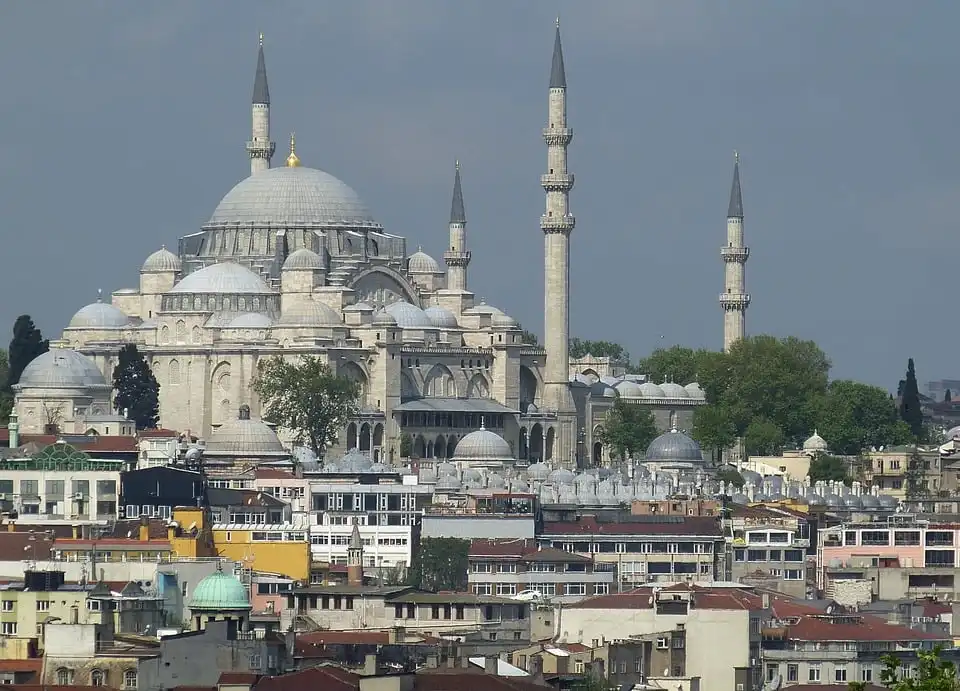
Istanbul offers various recreational activities and fun spots for adventure enthusiasts. Let’s discuss just five popular activities and spots you can enjoy there. Of course, the city has a lot more to offer.
Visit the Grand Bazaar
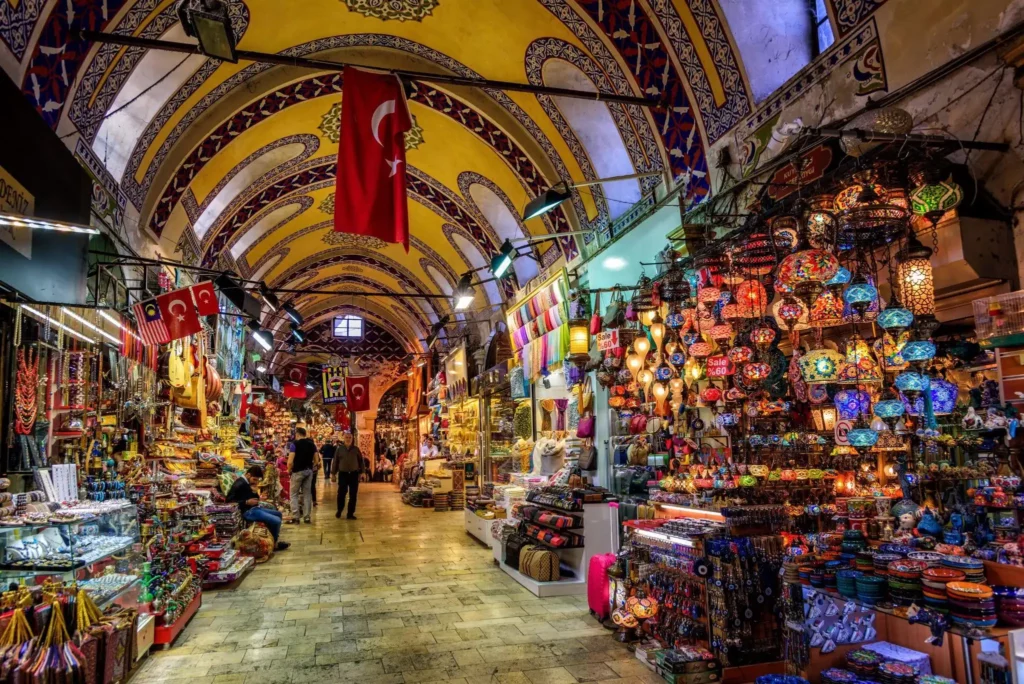
The Grand Bazaar is among the world’s oldest and largest covered markets. It offers a unique shopping experience with thousands of vendors selling everything from handmade carpets and jewelry to spices and textiles. You can spend hours wandering the labyrinthine streets of the bazaar and haggling with the vendors to get the best deals.
Take a boat tour along the Bosphorus
The Bosphorus Strait is the natural boundary between Europe and Asia and offers stunning views of the city. You can take a leisurely boat tour along the waterway and see the city’s iconic landmarks, including the Blue Mosque, Topkapi Palace, and the Maiden’s Tower.
Enjoy a night out in Taksim
Taksim is one of the most popular nightlife destinations in Istanbul. The area has bars, clubs, and restaurants catering to all tastes and budgets. You can enjoy a delicious meal, sip on a cocktail, or dance the night away at one of the many venues in the area.
Visit the Hagia Sophia
The Hagia Sophia is recognized as a UNESCO World Heritage Site and one of Istanbul’s most iconic landmarks. The building has served as a church, mosque, and museum over the centuries and offers a glimpse into Istanbul’s rich history and culture. You can admire the intricate mosaics and frescoes or climb to the top of the building for breathtaking views of the city.
Ride a hot air balloon ride in Cappadocia

While not technically in Istanbul, Cappadocia is a popular day trip destination. The area is known for its unique landscape of rock formations, fairy chimneys, and underground cities. You can ride a hot air balloon over the stunning scenery and marvel at the region’s beauty.
Istanbul has much to offer regarding recreational activities and fun spots. Whether you want to explore the city’s rich history and culture, shop until you drop, or enjoy a night out, there is something for everyone.
How safe is Istanbul?

While there is always a risk of terrorism or other security threats in any major city, Istanbul remains a safe destination for travelers and residents. The Turkish government has taken strong measures to address these issues, including increased police presence and security measures at popular tourist destinations and transportation hubs.
In Istanbul, the level of crime is moderate, with an increasing trend in the past three years. Visitors are moderately worried about muggings, robbery, and attacks (about 48%) but less worried about car theft. The city also faces moderate problems with property and violent crimes and drug use (about 43%).
However, the problem of corruption and home break-ins are high, with an average score of 70%. Walking alone during daylight is considered safe (70.19%), while caution is advised when walking alone at night. These perceptions are based on the experiences of visitors to the city in the past three years. 1127 participants made the survey possible
Cultural and social norms in Istanbul reflect the fusion of traditional Turkish values with modern influences. From food to dress to social etiquette, Istanbul’s cultural and social norms are as varied and dynamic as its people.
Let’s discuss a few:
- Being hospitable (misafirperverlik) is a highly valued virtue in Turkey, with Turks renowned for their generosity towards guests. Hosting is considered an honor, and unexpected guests are often referred to as ‘guests from God’ (Tanrı Misafiri)
- Bringing sweets, flowers, or gifts for children when visiting someone’s home is a kind gesture in Turkey.
- It is customary to wear clean socks when entering a Turkish person’s home, as shoes are often removed. In some cases, guests may be provided with slippers to wear
- Traditional Turkish or apple tea is served to guests on all occasions, typically in a small tulip-shaped glass with sugar. Expect to be offered tea or coffee as soon as you sit down with a Turkish host.
- When complimenting something in a Turkish person’s house, be careful not to give the wrong impression that you want it as a gift, as they may feel obligated to offer it.
- Turkish hosts offer food several times and encourage guests to have more servings than they can eat. It is best to arrive on an empty stomach and accept as much food as possible, even if you cannot finish it.
- It is disgusting to blow your nose or pick your teeth during a meal in Turkey.
- Only use your right hand to touch food; the left hand is associated with cleaning and should not be used to serve, offer, or pass food.
- In Turkey, offering and receiving gifts with two hands is customary.
- Opening gifts in front of the giver in Turkey is not typical.
In a nutshell, Istanbul’s culture and social norms are an exciting blend of tradition and modernity, where you can expect to experience a warm welcome and a rich cultural experience.
Political and economic stability
Turkey is a presidential representative democracy and constitutional republic that operates as a unitary state with a multi-party system. The World Bank’s development indicators show that in 2021, Turkey’s percentile rank for Political Stability and Absence of Violence/Terrorism was 12.26%. This metric reflects perceptions of the probability of politically-motivated violence or instability, including terrorism. The percentile rank represents its ranking among all countries covered by the indicator, with 0 indicating the lowest rank and 100 indicating the highest rank.
Economic stability
Turkey’s population was approximately 85.6 million as of 2022, making it one of the most populous countries in Europe and the Middle East. In December 2022, The country’s GDP per capita surged to 10,655.460 USD from 9,591.615 USD in December 2021. This is considered an upper-middle income level by the World Bank.
The Turkish economy is diverse and has been growing rapidly over the last decade, with industries such as textiles, automotive, and construction leading the way. The country’s central location between Europe and Asia has also allowed it to become an important hub for international trade.
Turkey has undergone several economic reforms recently, focusing on reducing inflation, increasing fiscal discipline, and attracting foreign investment. These reforms have helped to stabilize the economy and reinforce its resilience in the face of global economic challenges.
The country’s life expectancy at birth is also something to note, standing at around 78 years. This indicates that Turkey has significantly improved healthcare, sanitation, and nutrition.
No doubt, Turkey’s economy has been performing well recently, with a steady increase in GDP, a growing middle class, and a strong focus on economic reform. With its strategic location, diverse industries, and improving living standards, the country is poised to continue on its upward economic trajectory.
Language and language barriers
Turkish is Turkey’s main language. Although some English is spoken, the country’s rating in global proficiency ratings is low.
In a survey by The English Proficiency Index group, Turkey ranked 64 out of 111 countries. It also emerged with a global average score of 502 and a dismal 34 out of 35 in Europe. Regionally, Istanbul had an English Proficiency score of 499
Thirty minority, foreign and immigrant languages are also spoken, with Arabic, Kurdish, and Zazaki being close to Turkish in popularity.
Can you expect to meet many English speakers in Turkey?
Despite years of English education, a large percentage of Turks struggle with the language, with only 17% able to speak it at a level suitable for digital nomads or tourists.
While a language barrier may be possible during a trip to Istanbul due to the country’s low proficiency index, translation software has become increasingly popular and can help overcome communication difficulties.
Accordingly, many taxi firms and hospitality industry players worldwide utilize translation devices to cater to their diverse clientele. In touristy areas, communication in English is more feasible as shop owners and staff have gained proficiency through interactions with past visitors.
Additionally, a significant portion of university students in Istanbul is skilled in English, making it advisable to seek their assistance if needed.
Health and Vaccination

According to Nunmbeo.com data for 2023, Turkey has a Health Care Index of 71.0, which indicates the overall quality of the healthcare system in the country. In addition, it has a Health Care Exp Index of 127.8, which considers the cost of healthcare services.
The Health Care Index of 71.0 suggests that the city’s healthcare system is considered of moderate quality compared to other countries. This index is calculated based on several factors, such as the availability of healthcare facilities and staff, the quality of healthcare services, and the population’s overall health.
On the other hand, the Health Care Exp Index of 127.8 is designed to demonstrate the Health Care Index in a way that reflects an exponential increase in quality for a better healthcare system.
Istanbul’s healthcare system offers a variety of options for digital nomads seeking medical care while in the city. Note that Expats and digital nomads who live and work in Turkey for an extended period are often not eligible for public healthcare services, and private healthcare can be expensive. Therefore, the expat and digital nomad cover offers a more affordable option to ensure that you have access to quality healthcare services.
You may therefore consider the following key points.
Health insurance providers
Various insurance providers in Turkey offer expat and digital nomad health insurance plans. The coverage and premiums of these plans may vary based on the provider, the age of the applicant, and the level of coverage required. Compare different insurance providers and policies before choosing the one that best suits your needs. They include; Aetna, Cigna, Allianz care, and several others.
Telemedicine
Telemedicine services are widely available in Istanbul, and they can be particularly beneficial for digital nomads who may not have convenient access to traditional healthcare facilities. By using telemedicine, patients can remotely consult with healthcare providers through video conferencing or phone calls. Note, however, that telemedicine does not replace the need for mandatory health insurance coverage, which is required by visa regulations. It only comes in handy when, for example, you fall ill when your health insurance has issues you should fix.
Vaccinations
Before traveling, you should ensure you are up-to-date on all routine vaccines.
Air Quality Istanbul
According to IQAir, the current air quality in Istanbul is moderate, with an air quality index of 97 US AQI. The main pollutant is PM2.5, with a concentration of 34 µg/m³. Other pollutants such as PM10, O3, NO2, SO2, and CO are also present, with concentrations ranging from 9.3 µg/m³ to 850.6 µg/m³. Notably, the PM2.5 concentrations in Istanbul are 6.8 times the WHO annual air quality guideline value.
Istanbul’s air quality is heavily impacted by vehicular pollution, including cars, motorbikes, and lorries. This results in elevated levels of pollutants in the air, such as nitrogen dioxide (NO2) and sulfur dioxide (SO2). Additionally, vehicles emit black carbon and volatile organic compounds (VOCs), which are especially prevalent when running on diesel fuel or outdated engines.
Due to these levels of air pollution, it’s recommended that sensitive groups, such as people with respiratory problems, children, and the elderly, take precautions to protect themselves from exposure to outdoor air pollution.
You can;
- wear a mask when going outside
- run an air purifier inside your room
- keep windows closed to avoid dirty outdoor air
Additionally, you should reduce outdoor exercise, especially when air pollution levels are high.
Other forms of pollution
As a digital nomad in Istanbul, you might also be worried about various types of pollution, such as
- noise and light pollution
- drinking water pollution
- garbage management and disposal
A recent survey on Numbeo.com rates these pollution factors at 64.41, 49.19, and 45.26, respectively, on a scale of 100. Additionally, a significant number of respondents expressed dissatisfaction with the availability and condition of green parks in the city. Specifically, 70.75% of those interviewed felt that interventions were necessary to improve this aspect of urban life.
Electrical standards

Turkey operates on a 220-240-volt electrical system with a frequency of 50 Hz. The country’s standard plug type is the Euro plug, which has two round pins and is compatible with most electrical devices. However, some older buildings may still have outlets that use the Type F plug, which has two round pins and a grounding pin.
Ensure you have the appropriate adapters and converters to use your electronic devices locally. Following local regulations and safety guidelines is critical to prevent accidents and damage to equipment.
Telephone and internet plans
Several service providers offer telephone and internet plans in Istanbul. Let’s consider some of the most popular ones
Türk Telekom
This is the country’s largest fixed-line operator, providing both internet and telephone services to customers across Turkey. They have a range of packages available, including unlimited data plans, and also offer mobile services through their subsidiary, Turkcell.
Turkcell
Turkcell is Turkey’s largest mobile operator, offering mobile and fixed-line internet services. They have a dynamic range of plans to choose from, including prepaid and postpaid options and unlimited data plans.
Vodafone
Vodafone is another major mobile operator in Turkey, with a strong presence in the country’s internet market. They offer various plans, including prepaid and postpaid options and high-speed internet services for home users.
Superonline
A popular internet service provider in Turkey, offering high-speed internet services to both residential and business customers. They have a variety of packages available, including unlimited data plans and customized solutions for businesses.
D-Smart
D-Smart is a satellite television and internet service provider in Turkey, offering various plans for residential and business customers. Their internet services are available at various speeds and data packages.
There are several other service providers offering telephone and internet plans in Istanbul. Compare the features diligently, including prices of different plans to find the one that best meets your needs and budget.
Climates and seasons
Istanbul experiences a Mediterranean climate with mild, wet winters and hot, dry summers. The city’s annual climatic cycle can be divided into four distinct seasons, i.e., spring, summer, autumn, and winter.
Spring in the city usually begins in March and lasts until May. During this season, temperatures start to rise, and the city sees an increase in rainfall. The average temperature in March is around 12°C (53.6°F), which increases to about 22°C (71.6°F) in May. Spring is among the best seasons to visit Istanbul, as the city is blooming with colorful flowers and pleasant weather.
Summer in Istanbul lasts from June to August, characterized by hot and dry weather. The average temperature during this season ranges from 24°C (75.2°F) to 28°C (82°F), with occasional heat waves pushing the temperature up to 35°C (95°F). The humidity during summer can be quite high, making it feel even hotter. Due to the hot weather, many locals and tourists head to the city’s beaches, parks, and outdoor cafes to cool off.
Autumn in Istanbul lasts from September to November, characterized by mild temperatures and decreasing rainfall. The average temperature during this season ranges from 17°C (63°F) to 25°C (77°F), making it an ideal time to explore the city’s historical sites and museums. The fall foliage in Istanbul is also a sight to behold, with the trees turning shades of yellow and red.
Winter in Istanbul lasts from December to February, characterized by cold and wet weather. The average temperature during this season ranges from 6°C (43°F) to 11°C (51.8°F), with occasional snowfall. The city can be quite gloomy during winter, but it is still a great time to visit if you enjoy winter sports or festive celebrations.
Istanbul experiences a varied climatic and seasonal cycle throughout the year, with each season having its unique charm and activities to offer. Whether you are visiting during the sunny summers or snowy winters, the city has something for your enjoyment all year round.
| Monthly Averages – Daily Max Temperature (°C) | |||||||||||
| Jan | Feb | Mar | Apr | May | Jun | Jul | Aug | Sep | Oct | Nov | Dec |
| 9 | 9 | 12 | 17 | 22 | 27 | 30 | 30 | 25 | 20 | 15 | 11 |
| Monthly Averages – Rainfall (mm) | |||||||||||
| Jan | Feb | Mar | Apr | May | Jun | Jul | Aug | Sep | Oct | Nov | Dec |
| 68 | 72 | 58 | 43 | 23 | 24 | 19 | 25 | 44 | 76 | 69 | 85 |
Taxation for digital nomads
Istanbul hosts a significant number of freelancers who provide different services to clients worldwide. As a freelancer, you should pay taxes on your income, which is calculated based on your earnings. The estimated tax rates for freelancers can vary depending on their income level, as illustrated by the following examples:
If you earn $50,000 per year, the estimated tax you would owe to Istanbul’s tax authority would be $17,500. This represents a tax rate of 35%, which is applied to your total income.
For a nomad earning $100,000 per year, the estimated tax they would owe would be $35,000. This is also a tax rate of 35%, which remains constant regardless of the freelancer’s income level.
If you are earning $250,000 per year, the estimated tax you would owe would be $87,500. Although this represents a higher tax amount, the tax rate of 35% remains the same.
These estimated tax rates are subject to change and may vary based on several factors, including your residency status and the nature of your work. For example, if you are on a lucrative contract, earning above $800,000 per year, you will be taxed 40% income tax.
You must keep detailed records of your income and expenses to accurately calculate the taxes you owe the taxman.
Nomads in Istanbul must know their tax obligations and plan accordingly to avoid unexpected expenses or penalties. By keeping accurate records and consulting with a tax professional, you can ensure that you meet your tax obligations while maximizing your income potential.
Popular cuisine

Istanbul is a food lover’s backyard with a rich culinary history that entertains influences from various regions of Turkey and the Middle East. As a digital nomad visiting Istanbul, you can sample a variety of delicious and unique foods. You should certainly try out these recipes.
Kebabs
Kebabs are a staple of Turkish cuisine, and for your information, Istanbul makes some of the best kebabs in the world. Whether you prefer lamb, beef, chicken, or vegetarian options, there is a kebab for everyone. The most popular types of kebabs in Istanbul include Adana kebab, Iskender kebab, and doner kebab.
Baklava
This is a sweet pastry made with layers of phyllo dough loaded with chopped nuts and syrup or honey. Istanbul is famous for its baklava, which is often made with pistachios and served with a cup of Turkish coffee. Some of the best places to try baklava in Istanbul include Karakoy Gulluoglu and Hafiz Mustafa.
Turkish Breakfast
If you are a fan of cheese, olives, eggs, bread, honey, jam, and sometimes even meat, then the Turkish breakfast, or “kahvalti,” is your breakfast in Istanbul. Some of the city’s best places to enjoy a traditional Turkish breakfast include Van Kahvalti Evi and Kale Cafe.
Meze
This is a collection of small dishes served as appetizers or snacks. Istanbul is famous for its meze culture, which includes dishes such as hummus, eggplant dip, stuffed grape leaves, and seafood. Some of the best places to try meze in Istanbul include Meyhane, Refik, and Meze by Lemon Tree.
The Turkish Delight
Turkish Delight, or “lokum,” is a sweet, jelly-like candy made with starch and sugar, often flavored with rosewater, pistachio, or other flavors. Istanbul presents some of the best Turkish Delight shops in the world, including Haci Bekir and Ali Muhiddin Hacı Bekir.
Common concerns
Istanbul is a beautiful city, rich in history and culture, but it may have several downsides to living and working for an expat and digital nomad.
One main drawback of Istanbul is the level of free speech is not as common as one would expect from the . This can create an atmosphere of censorship and self-censorship, which can be frustrating for digital nomads who rely on the free flow of information to do their work.
Another challenge for digital nomads in Istanbul is the slow internet connection in some areas, making it difficult to work efficiently. Additionally, there may not be much to do in Istanbul, especially for those who prefer outdoor activities or have specific hobbies or interests.
The weather can also be a challenge for digital nomads in Istanbul, as it can get very cold in the winter and very damp in the spring. This can make it difficult to enjoy outdoor activities and create a dreary atmosphere that can impact productivity.
Furthermore, Istanbul can feel crowded, and people may not speak English well, making navigating and communicating challenging. Nomads contributing to Nomad List regard it as unsafe, or women and Istanbul may not be family-friendly due to the many people who smoke tobacco in public spaces.
Despite these few concerns, expats and freelancers continue landing in Turkish largest and even returning (over 16%). This means there is a side to Istanbul that is brighter than the issues reported by a few unhappy nomads.
Always check with local country websites for the most up to date visa, health, tax and travel requirements before entering a country. This article is general information and does not constitute legal advice, check with a legal professional for visas, working visas, applicable tax and crypto laws specific to you.

